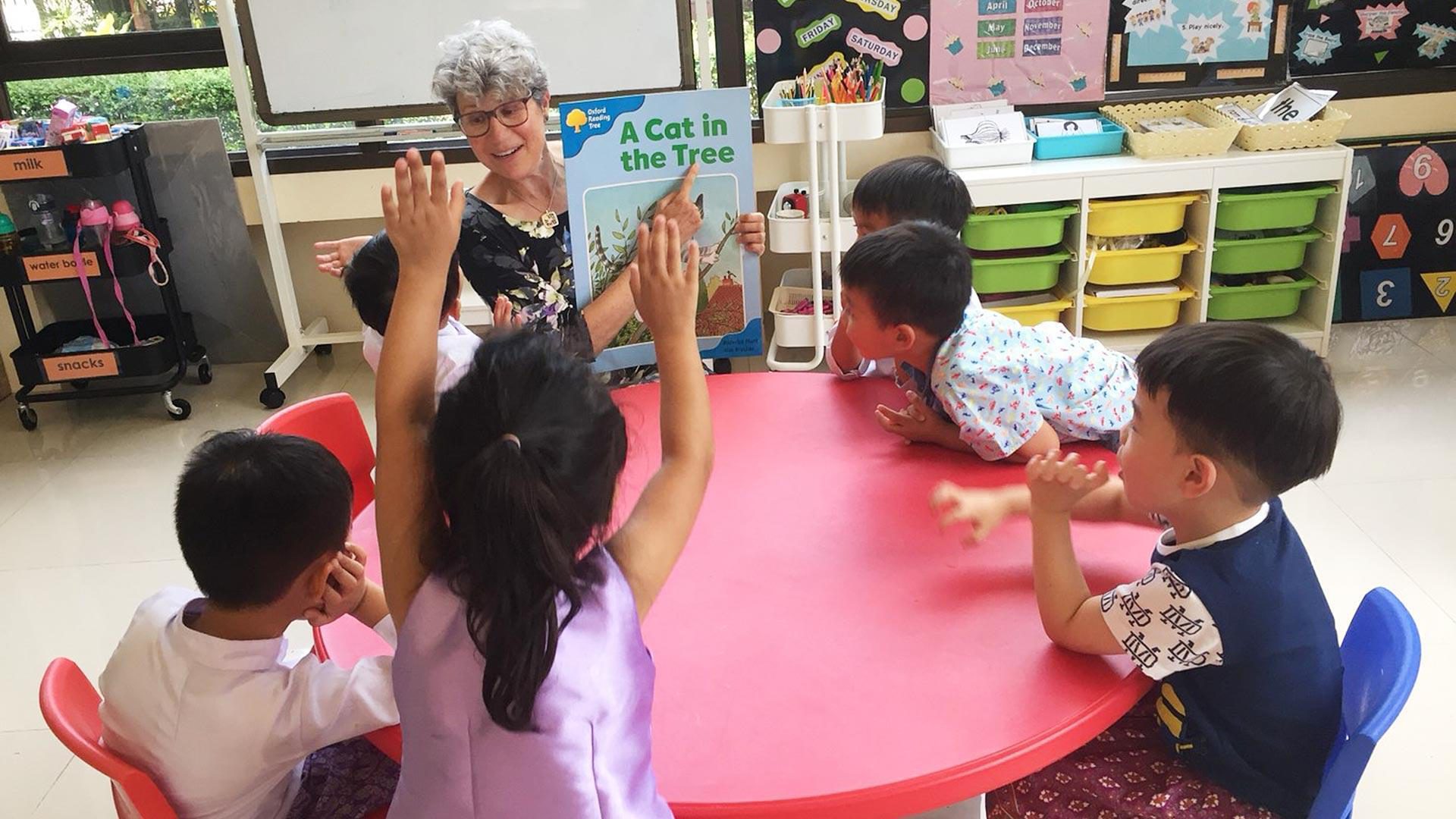- June 06, 2023
- By Sala Levin ’10
After Dian Seidel Ph.D. ’92 retired from her career as a climate scientist in 2016, she could have settled into a life of European vacations, summers spent traveling from an air-conditioned cabana to a poolside lounge chair and visits to New York City to see her daughter.
Heck, that was the kind of retirement her husband, Steve M.Ed. '05, was envisioning for the pair. Instead, Dian convinced Steve to try a different version of post-working life: sweltering in rural Thailand, teaching English to squirmy toddlers and managing life’s everyday chores in a language neither of them spoke.
Now, Seidel has written “Kindergarten at 60: A Memoir of Teaching in Thailand,” the story of undertaking the kind of world-broadening project more often tackled by twenty-something explorers than by sixty-something suburbanites. The book is being released this month by Apprentice House Press, a student-run book publisher out of Loyola University Maryland.
“It’s a different and, I would say, maybe more authentic experience than being a tourist in the country,” said Seidel. “You get a local cell phone and deal with the local cell phone company. You see the bureaucracy. It’s all interesting. It’s as much of an adventure as seeing the Emerald Buddha in Bangkok.”
Neither Thailand nor teaching English were new to Seidel. She and her husband had visited the country during their honeymoon in 1990, and after decades working as an expert on weather balloons at the National Oceanic and Atmospheric Administration, she had volunteered as an English tutor through the Washington English Center. (Steve also volunteered there and had spent part of his career as a public school teacher.)
She’d always wanted to live overseas, and after convincing Steve, obtaining the necessary certifications—and breaking the news to their adult daughter and Dian’s then-95-year-old mom—Seidel turned to the question of where to go. For reasons ranging from lack of EU passports to age restrictions, the couple was turned down for positions in Chile, Italy, Costa Rica and other countries. They broke their no-humidity rule for jobs in Thailand.
“We have memories” of Thailand from their honeymoon, Seidel writes, “some vivid, some vague. Touring Bangkok to see the Golden Buddha, the Emerald Buddha and the Reclining Buddha, and passing thousands of other Buddhas every day. The all-purpose greeting sawaddee and the accompanying wai gesture—palms joined at the chest, head bowed. The melody of the Loy Krathong song for the autumn full moon holiday, an earworm even after all these years. Sweet, strong iced coffee that became a daily necessity. Traffic jams everywhere. Sweating all the time.”
They discovered that working in this Thai school would require another compromise: Though Seidel wanted to work with adults, these jobs would be teaching kindergarteners—in a country where kindergarten can start at age 2.
“These kids can smile their way into your heart, but, oh my God, they can also run you ragged,” said Seidel. She and her husband spent their days singing, counting and reading with the children, accompanying them on field trips and changing diapers when necessary.
The two lived for four months in a small apartment arranged for them by the school, navigating day-to-day life in a language in which they only knew basic phrases. Cultural differences popped up, too: Seidel thought the kids’ curriculum was too regimented, not allowing enough time for simply playing, but she understood that she was a visitor with a Western perspective.
While abroad, Seidel, who’d liked writing since working for her high school newspaper, kept her family and friends updated with emails detailing their escapades. Recipients told her that her writing was so vivid that they could picture Thailand through her words. When she returned to the U.S., just as the COVID-19 pandemic was overtaking the world, she started taking writing workshops online and turning her emails into a memoir.
Readers “might take from it inspiration to try something similar, to be courageous, to not just get all comfy in their retirement,” said Laura Oliver, a book editor who worked with Seidel. “It’s a way to witness how somebody else took a chance and tried to do some good in the world with their available means and time.”
Topics
People